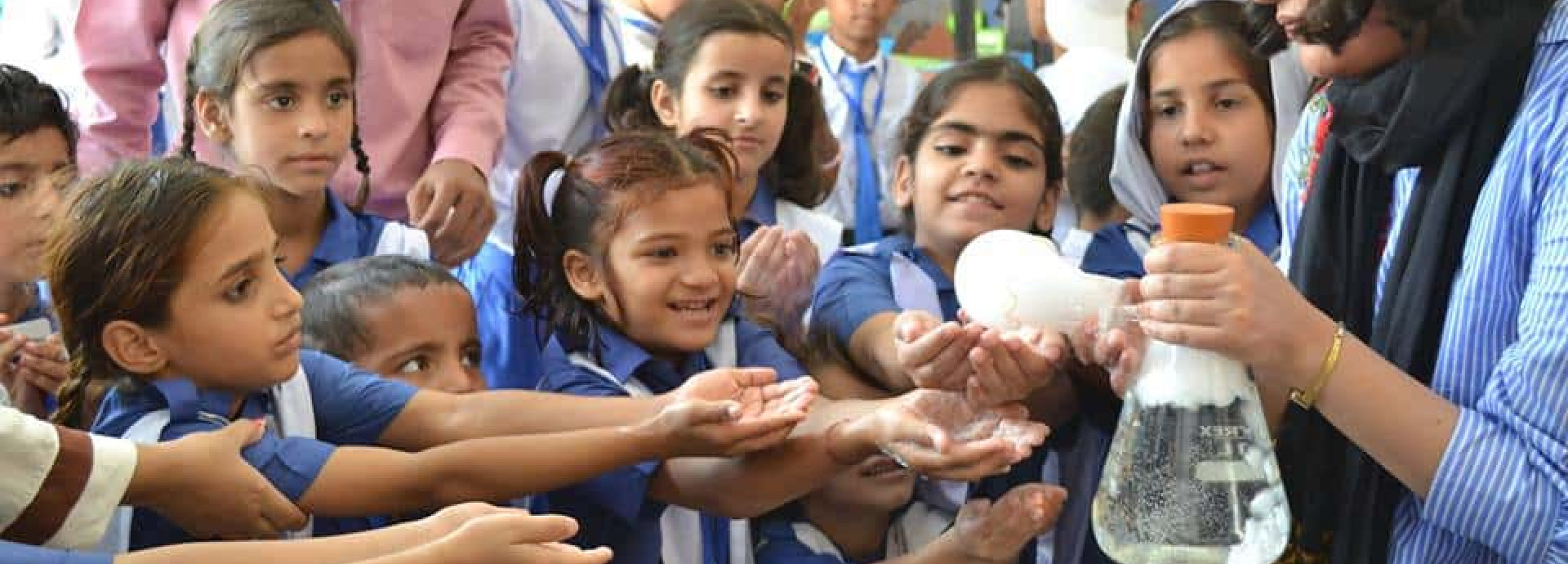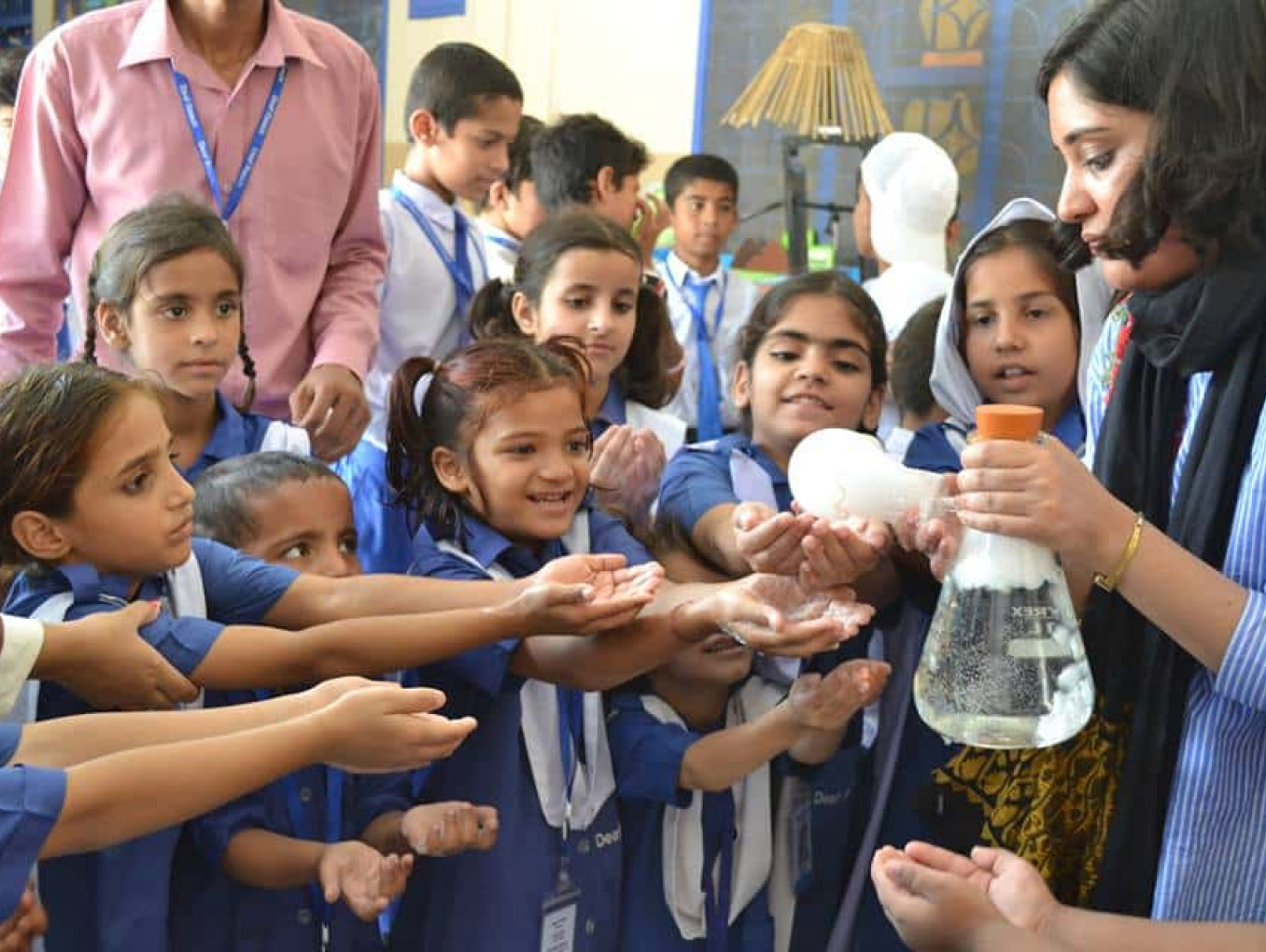

Science Fuse: "Be inspired by Science Engagement practitioners from around the world"
Science Fuse
We spoke to Lalah Rukh, Falling Walls Engage Winner 2021, about her project and how the Falling Walls Engage Pitches helped to increase the visibility of Science Fuse and to get future collaborations.
What is your project about?
Science Fuse is a social enterprise that works to improve the quality of STEM education for children in Pakistan, especially for those who’re marginalised from good quality Science Engagement and education. We work closely with schools, communities and families to offer all-year-round STEM education programs where children learn through a curriculum that makes science hands-on, relevant and inspiring. We also produce educational resources such as books, podcasts and posters that allow children to engage with science beyond the classroom.
In the last 3,5 years, we’ve engaged 47.000 children aged 3 - 14 years and provided training to almost 670 teachers across Pakistan. We have also nurtured a community of 200 fellows who come from diverse socioeconomic backgrounds and geographies.
More recently we have partnered with the Federal Directorate of Education in Pakistan to provide technical assistance to the government on how it can improve the quality of science and maths education for children enrolled in 13.000 public schools, with a special focus on making quality STEAM education accessible for girls. This project is supported by the Malala Fund. It has allowed us to dive deeper into understanding how the science capital of marginalised communities (especially girls) is shaped in our country and how we can make science more accessible for those who feel alienated from it.
It’s a matter of social justice that children from disadvantaged backgrounds grow up with learning opportunities that equip them to lead a life of dignity & purpose.
Lalah Rukh, Falling Walls Engage Winner 2021
What made you start this project and how did Falling Walls Engage and its community contribute to the further development of your project?
I started this project because I had very limited opportunities to engage with science informally while growing up in Pakistan. This is even though my parents could afford to send me to mid-level private schools. However, millions of children in Pakistan are enrolled in public schools where the quality of science and maths education remains dismal. Moreover, these children have no opportunities to engage with science informally outside the classroom. It’s a matter of social justice that children from disadvantaged backgrounds grow up with learning opportunities that equip them to lead a life of dignity and purpose. Falling Walls Engage allowed me to learn and be inspired by Science Engagement practitioners from around the world. It was a great opportunity to mingle with them and learn from their journeys of resilience. Attending the Falling Walls Engage Pitches also made me see how diverse voices in science can be highlighted and presented to different audiences.
In which Falling Walls Engage format did you participate?
We participated in the Falling Walls Engage Pitches in 2021. I attended the event in person in Berlin and presented a brief presentation about our work on stage.
Being connected with them [...] has helped me draw inspiration from their work.
Lalah Rukh, Falling Walls Engage Winner 2021
Did the Falling Walls Engage format(s) facilitate contact with other projects for collaborations?
We collaborated with some of the Falling Walls Engage community members for our series titled ‘Meet A Scientist’ which aims to humanise people who work in science or use it in their daily lives. We reached out to some of the community members through WhatsApp and invited them to our online show. The format also helped me in getting to know some of the other winners in the Science Engagement category on a more personal level. Being connected with them through the WhatsApp group has allowed me to stay in touch even after the event. This has helped me draw inspiration from their work. It has generally been quite easy to stay connected with the community.
Did you experience an increase in the visibility of your project through the collaboration with Falling Walls Engage? How is this noticeable?
During the Falling Walls Engage Pitches in 2021, I was interviewed by science journalist Abdullahi Tsanni for Nature Career Q & A. I met him during the Falling Walls Science Summit held in Berlin. The article helped create a lot of visibility for our work in Pakistan and elsewhere. It spoke specifically about our work on making science education more inclusive for girls who come from disadvantaged backgrounds in Pakistan. The article also features some of our posters from the series ‘Remarkable Women in STEM’ that aims to create more visibility for female role models in STEM for children & young people.
It aims to break walls that make people from diverse communities feel that science isn’t something ‘for’ them.
Lalah Rukh, Falling Walls Engage Winner 2021
What makes Falling Walls Engage unique to you?
To me, Falling Walls Engage is special because it aims to break walls that make people from diverse communities feel that science isn’t something ‘for’ them. The team at Falling Walls Engage embodies this mission. Their empathy and kindness during the whole journey was truly remarkable to me. I was also happy to see that apart from researchers, the work of Science Engagement practitioners like myself was also being celebrated and highlighted.
What was your most emotional experience when considering your collaboration with Falling Walls Engage?
My most emotional experience was thinking about how I would take the stage to tell the story of a 10-year-old girl, Aleena who was inspired to pursue her interest in science through our work with her school during the pandemic. She belongs to a part of Pakistan that has one of the world’s lowest female literacy rates and where gender stereotypes keep girls away from science. Sharing Aleena’s journey was a significant moment as it helped us highlight how gender parity in STEM education remains a big problem in Pakistan. This is a topic that isn’t highlighted enough, hence speaking about it on an international platform was both emotional and significant.